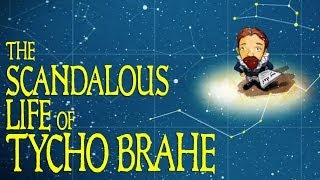(单词翻译:单击)
How do you imagine the life of a scientist?
你是如何想象科学家的生活的?
Boring and monotonous, spending endless hours in the lab with no social interaction?
枯燥和单调?在实验室里度过无尽的时间?没有任何社交?
Maybe for some but not Tycho Brahe.
也许有些科学家是这样的,但第谷·布拉赫不是。
The 16th century scholar who accurately predicted planetary motion and cataloged hundreds of stars
这位16世纪的学者,精确预测了行星运动并编目了数百颗星星,
before the telescope had been invented also had a cosmic-sized personal life.
而且是在望远镜发明之前,他同时也有着宇宙般广阔的个人生活。
Tycho Brahe was born in 1546 to Danish nobles, but at age two was kidnapped to be raised by his uncle instead.
第谷·布拉赫于1546年出生于丹麦的贵族之家,但在两岁时,他被其伯父擅自带走并抚养长大。
His parents didn't seem to mind.
他的父母对此似乎并不在意。
Tycho was supposed to have a career in law, but after witnessing a solar eclipse at thirteen,
第谷原本应该去从事法律工作,但是在他13岁时目睹了一次日全食之后,
he began spending more time with mathematics and science professors, who taught him the art of celestial observation.
他开始把更多的时间花在与数学和科学教授待在一起,他们教给他天体观测的技巧。
By the time Tycho's uncle sent him off to Germany a few years later, he had lost interest in his law studies,
几年后第谷的伯父将他送去德国,此时他对法律学习已经完全失去了兴趣,
instead reading astronomy books, improving his instruments, and taking careful notes of the night skies.
转而阅读天文学书籍,改进他的仪器设备,并仔细地记录夜空。
It wasn't long before his own measurements were more accurate than those in his books.
没过多久,他自己所做的测量就已经比书中的更为精确了。
While in Germany, Tycho got into a bit of an argument with another student at a party over a mathematical formula,
在德国期间,第谷和另一个学生在一个舞会上因为一个数学公式而发生争吵,
resulting in a sword duel and Tycho losing a good-sized chunk of his nose.
最后这演变为一场长剑决斗,而第谷在决斗中失去了相当大的一部分鼻子。
After that, he was said to have worn a realistic prosthetic of gold and silver that he would glue onto his face.
此后,据说他戴着一个金银制做的逼真的假鼻子,他将其粘贴在自己的脸上。
Fortunately, Tycho didn't need his nose to continue his astronomical work.
幸运的是,第谷不需要用鼻子来继续他的天文学工作。
He kept studying the night sky and creating all sorts of instruments,
他继续研究着夜空,并制造了各种类型的仪器,
including a building-sized quadrant for measuring the angles of stars.
包括一台房子大小的象限仪,用于测量星星的角度。
After months of careful observation, Tycho discovered a new star in the constellation Cassiopeia.
经过数月的仔细观测,第谷发现了一颗新的恒星,位于仙后座。
The publication of this discovery granted him rock star status and offers of scientific positions all over Europe.
这一发现的公布给于了他摇滚巨星般的地位,以及欧洲各地的科学职位任职邀请。
Wanting to keep him at home, the King of Denmark offered to give Tycho his own personal island with a state of the art observatory.
为了把他留在祖国,丹麦国王承诺给于第谷他的私人小岛和当时最先进的天文台。

Called Uraniborg and costing about 1% of Denmark's entire budget, this observatory was more of a castle,
这个叫做Uraniborg的天文台花费了丹麦全国预算的1%,它更像一个城堡,
containing formal gardens, rooms for family, staff and visiting royalty,
包含了正规的花园,以及给家人、员工和来访皇室成员的房间,
and an underground section just for all the giant instruments.
还有一个放置所有巨大仪器的地窖。
Tycho also built a papermill and printing press for publishing his papers, and a lab for studying alchemy.
第谷还建造了造纸厂和印刷机,用于发表他的论文,还有一个研究炼金术的实验室。
And since no castle would be complete without entertainment, Tycho employed a clairvoyant dwarf named Jep as court jester.
城堡怎么可以没有娱乐节目,于是第谷还雇佣了一个宫廷弄臣,一个名为杰普的未卜先知的侏儒。
Tycho lived on his island, studying and partying for about 20 years.
第谷生活在他的岛上,进行研究和派对狂欢了约20年。
But after falling out with the new Danish King,
但是,在和丹麦的新国王闹翻以后,
he took up an invitation from the Holy Roman Emperor to become the official imperial astronomer in Prague.
他接受了神圣罗马帝国的一个邀请,在布拉格担任官方的皇家天文学家。
There, he met another famous astronomer Johannes Kepler, who became his assistant.
在那里他遇到了另一位著名的天文学家约翰内斯·开普勒,他成为了第谷的助手。
While Kepler's work interested him, Tycho was protective of his data, and the two often got into heated arguments.
第谷对开普勒的研究很有兴趣,但同时第谷严密保护自己的数据,双方时常陷入激烈的争吵。
In 1601, Tycho attended a formal banquet where he drank quite a lot
1601年,第谷出席了一个正式晚宴,席间他喝了很多,
but was too polite to leave the table to relieve himself, deciding to tough it out instead.
但他太过礼貌以至不愿离席去上厕所,于是决定就这么憋着。
This proved to be a bad idea, as he quickly developed a bladder infection and died a few days later.
后来证明这是一个坏主意,他很快就患了膀胱感染,数天后就去世了。
But over 400 years after his death, Tycho still had a few surprises up his sleeve.
但是他逝世400年后,第谷仍能给我们带来些意想不到的东西。
When his body was exhumed and studied in 2010,
2010年,当他的遗体被发掘出来进行研究时,
the legendary gold and silver nose was nowhere to be found,
传说中的金银鼻无处可寻,
with chemical traces suggesting that he wore a more casual brass nose instead.
化学痕迹显示他其实带着一个更随便的铜质鼻子。
Tycho's mustache hair was also found to contain unusually high levels of toxic mercury.
第谷的胡须里发现了异常高含量的有毒物质水银。
Was it from a medicine used to treat his bladder infection?
这是否来源于治疗膀胱感染的药物?
A residue from his alchemy experiments?
或是他做炼金术实验的残留物?
Or did his quarrelsome coworker Johannes Kepler poison him to acquire his data?
还是他那个好争论的同事约翰内斯·开普勒为了得到他的数据而下了毒?
We may never know, but the next time you think scientists lead boring lives, dig a little deeper.
我们可能永远也不会知道,但下回你再认为科学家们的生活无聊,更深入地探究一下吧。
A fascinating story may be just beyond the tip of your nose.
一个引人入胜的故事可能就近在咫尺。


